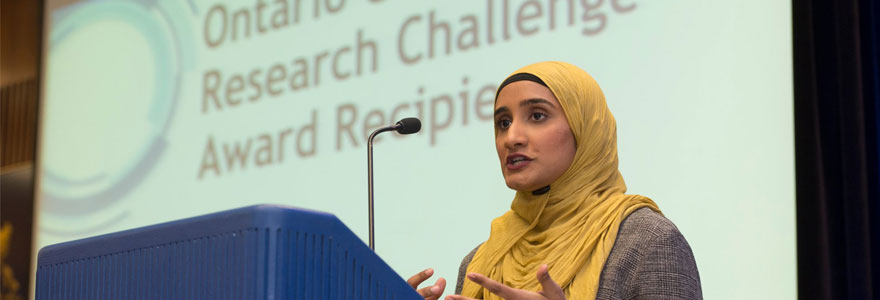News and Updates
Contact
Faculty of Social Science
Social Science Centre
Room 9438
Western University
T. 519-661-2053
F. 519-661-3868
E. social-science@uwo.ca
Turning the paper into policy
March 26, 2018
Story by Rob Rombouts
For students, the policy implications of their research may often seem distant. Awish Aslam, PhD student in the Department of Sociology, was one of three people who was recently recognized for the policy potential of their work.
Aslam was one of three winners of the 2017 Ontario Graduate Policy Research Challenge.
The challenge is open to people related to work in education, and the labour market. Graduates are invited to submit their research, creating a policy brief, including policy recommendations.
Aslam submitted her M.A. research, which focused on school to work transitions among second-generation Canadians, examining the experiences of second-generation immigrants in the labour market, and comparing the experiences of visible minorities and non-visible minorities.
“While second-generation immigrants have higher rates of postsecondary attainment compared to those with Canadian-born parents, for visible minority second-generation immigrants, high educational attainment does not always transfer into positive labour market outcomes,” said Aslam.
Following her research, Aslam identified several key barriers that inhibited a smooth transition, including: a precarious labour market, lack of access to career-related networks, and covert racial discrimination.
Canadian data indicates that this pattern of economic disadvantage among the second generation is evident across the country in all jurisdictions, but it is of particular importance in Ontario, as this province has one of the highest proportions of second generation immigrants and this population is also relatively young. The overrepresentation of this population in younger age groups is significant, as these young people are increasingly making the transition from school to work. High levels of postsecondary attainment among the second generation is a success that is unique to Canada.
In her presentation, Aslam suggested increasing opportunities for experiential learning in postsecondary institutions, creating a mentorship program that links recent postsecondary graduates with professionals in their field, and offering incentives to employers to promote racial diversity in their hiring and in the workplace more broadly through wage subsidies or tax credits.
“It was a great experience,” said Aslam. “Through the symposium, I made connections with actual policy makers.” This included representatives from Ontario Ministry of Citizenship and Immigration.
“It was nice to see people who can actually use your research to make a difference,” said Aslam. “It’s all in your head when you write your thesis, but I was able to talk to people who want to use my research. I saw an opportunity and willingness among policy makers to want to work with academics.”
Aslam is continuing to research the topic in her PhD studies, focusing specifically on second generation Canadian Muslim women. “Muslim women have a higher rate of unemployment and poverty,” said Aslam. “In general, the Muslim population faces a lot of challenges in their labour market integration. There is not a lot of research into the area as to why. There are assumptions as to why, but not a lot of research.”

